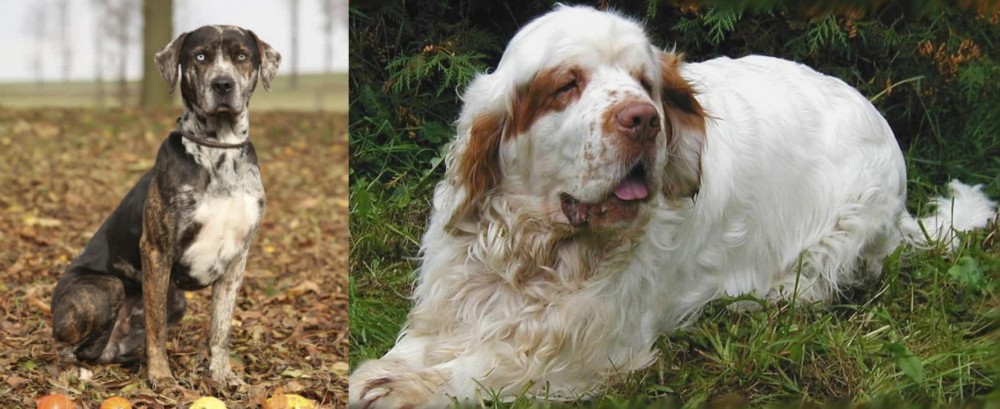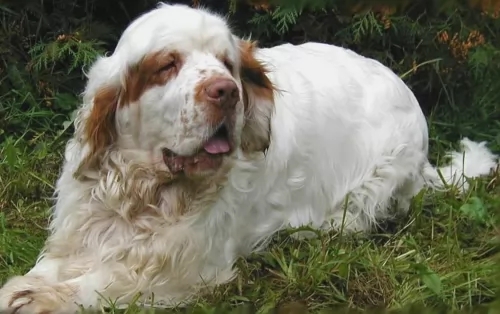 Petzlover
Petzlover Catahoula Leopard is originated from United States but Clumber Spaniel is originated from United Kingdom. Catahoula Leopard may grow 17 cm / 7 inches higher than Clumber Spaniel. Catahoula Leopard may weigh 9 kg / 20 pounds more than Clumber Spaniel. Both Catahoula Leopard and Clumber Spaniel has almost same life span. Catahoula Leopard may have more litter size than Clumber Spaniel. Catahoula Leopard requires Low Maintenance. But Clumber Spaniel requires High Maintenance
Catahoula Leopard is originated from United States but Clumber Spaniel is originated from United Kingdom. Catahoula Leopard may grow 17 cm / 7 inches higher than Clumber Spaniel. Catahoula Leopard may weigh 9 kg / 20 pounds more than Clumber Spaniel. Both Catahoula Leopard and Clumber Spaniel has almost same life span. Catahoula Leopard may have more litter size than Clumber Spaniel. Catahoula Leopard requires Low Maintenance. But Clumber Spaniel requires High Maintenance
 This working dog breed originates from America’s Deep South. In fact it was originally named after a small village in the state of Louisiana and was made the state’s official dog in 1979. The dog is believed to have come from the Mastiff and Greyhound.
This working dog breed originates from America’s Deep South. In fact it was originally named after a small village in the state of Louisiana and was made the state’s official dog in 1979. The dog is believed to have come from the Mastiff and Greyhound.
Known as war dogs they were left with local tribes who crossed them with wolves, and French Beauceron blood was also included.
A number of Catahoula dog Associations were started and the Louisiana Catahoula Cur Association was formed in 1976, followed by others. These Associations work to promote the breed. In 1995 the United Kennel Club was the first national dog registry to recognize the Catahoula.
 Ever since winning in Confirmation at Westminster Kennel Club’s annual show, the popularity of the Clumber Spaniel has increased markedly. The breed of Clumber Spaniel comes from the United Kingdom and it is the largest of all the spaniels. The breed is named for the Clumber Park where it was developed in Nottinghamshire. The Clumber Spaniel a=was designed to be a gundog or hunter in heavy weeds or cover. They have been popular with the Royal Family and were kept by King George V, King Edward VII, and Prince Albert.
Ever since winning in Confirmation at Westminster Kennel Club’s annual show, the popularity of the Clumber Spaniel has increased markedly. The breed of Clumber Spaniel comes from the United Kingdom and it is the largest of all the spaniels. The breed is named for the Clumber Park where it was developed in Nottinghamshire. The Clumber Spaniel a=was designed to be a gundog or hunter in heavy weeds or cover. They have been popular with the Royal Family and were kept by King George V, King Edward VII, and Prince Albert.
It is possible that during the French Revolution, the Duc de Noailles gave his spaniels to the Duke of Newcastle in Nottinghamshire, These spaniels, Alpine Spaniel, are extinct. At the time they were bred with Basset Hounds and Great Pyrenees.
Another line of thought has the Clumber Spaniel descending form an ancient Bleinheim Spaniel, which was used to later develop the King Charles Spaniel.
Whichever theory is true, we know that they were first bred and improved by William Mansell. They were shown in 1859 in England. They were bred almost exclusively by nobility until the mid-19th century. Then World War 1 caused all breeding to be discontinued and the number of Clumbers declined drastically, only to be redeveloped after the was by King George V.
The Cumber won Best in Show at the prestige’s Crufts 1991 Centenary Show. When the American Kennel Club recognized the Clumber Spaniel, there were only 9 other breeds officially recognized. They came to Canada in the same year of 1884. They are also recognized by the UK Kennel Club as a Vulnerable Native Breed. A Clumber bred by Doug Johnson won Best in Show at the 1996 Westminster Dog Show.
The Clumber Spaniel is a loyal, gentle soul who is not very friendly with strangers. They shed all the time and snore loudly.
 Known as the Leopard dog because of the distinctive spotted patches on his short to medium length coat, this interesting looking spotted dog can have a coat of many colors such as solid colors, brindle and a blend of several colors including blue merle and red merle, black and tan.
Known as the Leopard dog because of the distinctive spotted patches on his short to medium length coat, this interesting looking spotted dog can have a coat of many colors such as solid colors, brindle and a blend of several colors including blue merle and red merle, black and tan.
He is a muscular and athletic dog of medium to large size with sturdy legs and deep chest. He stands at 56 – 68cm and weighs 20 – 50kg. Many of these dogs have webbing between the toes which gives them an advantage when running through marshy areas or when swimming.
With his floppy ears, the tail is long or bobtailed. An unusual aspect with the dog is his eyes – having what is known as marbled glass eyes which are blue or blueish-white in color.
The Catahoula Leopard Dog can be stubborn and he is also energetic, fearless and highly intelligent. You’ll want to have him trained and socialized early as then he becomes a more relaxed, obedient dog. He is an assertive dog but not aggressive by nature.
Catahoulas in general are even tempered and they are willing to share their space with children in the home as well as other pets. They are protective of children and of their entire human family, making good watchdogs.
 The Clumber Spaniel is heavy-boned, with a very large head and a square muzzle. Of all spaniels, he is the biggest. His expressive face wears a dopey, sad look and his eyes are large, shaped like leaves. The muzzle is as large as the head and his nose is square. He has freckles on his muzzle and a deep chest. His legs are straight, and his feet are solid.
The Clumber Spaniel is heavy-boned, with a very large head and a square muzzle. Of all spaniels, he is the biggest. His expressive face wears a dopey, sad look and his eyes are large, shaped like leaves. The muzzle is as large as the head and his nose is square. He has freckles on his muzzle and a deep chest. His legs are straight, and his feet are solid.
The Clumber Spaniel gives off a dignified air and despite his expressions, he is ready to play or to work at any time.
 The Catahoula makes a fine family pet but he is a dog which shouldn’t be left outside day after day. He is a companion dog and won’t thrive without the companionship of his human family.
The Catahoula makes a fine family pet but he is a dog which shouldn’t be left outside day after day. He is a companion dog and won’t thrive without the companionship of his human family.
He is highly intelligent and also energetic, and if you want him to be relaxed and amicable around other humans and pets in the home he will require training and socialization. For training and ownership, the Catahoula Leopard will require a strong, firm, confident personality and he’ll be an obedient, loving and loyal companion.
 Your Catahoula Leopard is a healthy dog breed and with good care he can live to be 10 to 14 years of age. However, there are a number of reasons why some of the healthiest dogs can become ill.
Your Catahoula Leopard is a healthy dog breed and with good care he can live to be 10 to 14 years of age. However, there are a number of reasons why some of the healthiest dogs can become ill.
Knowing about these illnesses means you can take action and minimize the pain and suffering your pet might have to otherwise endure.
You’ll notice your pet shaking his head and maybe even scratching his ears. Ear infections are more evident in dogs with floppy ears and there can be an ear discharge. When left untreated, the ears can become painful and then it is time to get him to the vet.
This is a common illness in dogs and can be terribly uncomfortable and debilitating for your pet as he tries to urinate all the time with no success. Signs of UTI can include this excessive urination with little urine coming out, lethargy and discomfort. Take your pet immediately to the vet to be checked over.
 The Clumber Spaniel can suffer from a variety of conditions due to its very design and genetics. Lameness early in life can be attributed to the large and fast-growing bones in the Clumber. This lameness will dissipate when the pup is fully grown. Other issues include:
The Clumber Spaniel can suffer from a variety of conditions due to its very design and genetics. Lameness early in life can be attributed to the large and fast-growing bones in the Clumber. This lameness will dissipate when the pup is fully grown. Other issues include:
Can become dehydrated and all the problems that arise from a dog being overheated and dehydrated.
Must have a caesarian section. They may also have a sensitivity to the anesthesia used in the procedure.
Hypothyroidism with ear and skin complications.
They cannot take sulfa drugs.
 A dog makes such a splendid pet, willing to give loyal and loving friendship to humans, even those who don’t treat him properly. When you think of the unconditional love your Catahoula Leopard dog will give you, surely you want to provide him with good food and shelter.
A dog makes such a splendid pet, willing to give loyal and loving friendship to humans, even those who don’t treat him properly. When you think of the unconditional love your Catahoula Leopard dog will give you, surely you want to provide him with good food and shelter.
It can be devastating if your dog goes missing, and if he has no identification, to find him might only mean telling people what he looks like. Rather put a collar on him and an ID tag so that your chances of getting him back are just that much better.
You can also have him micro-chipped by your veterinarian and these chips have a unique code which can provide useful information on your pet.
Make sure that your pet is vaccinated as a puppy against diseases which could be deadly such as rabies.
If you have no intention of allowing your Catahoula Leopard to have puppies, rather have him neutered or spayed if its a female. It is better for them and they can live longer and be free of some ailments that at un-spayed or un-neutered dog may get.
 The Clumber has a tendency to gain weight and become obese. Feed them wisely. Feed about ¼ to ½ of a cup of high quality dry dog food twice a day.
The Clumber has a tendency to gain weight and become obese. Feed them wisely. Feed about ¼ to ½ of a cup of high quality dry dog food twice a day.
This can be cervical or spinal. The discs can be bulging or ruptured. Can lead to paralysis if not treated properly.
Entropion with inward rolling of eyelid or Ectropion with outward rolling of eyelid.
The Clumber Spaniel is not the most energetic of canines. He still needs moderate exercise daily but don’t overdo it. Walks, fetch, swimming, chase or confirmation are good activities for a Clumber.